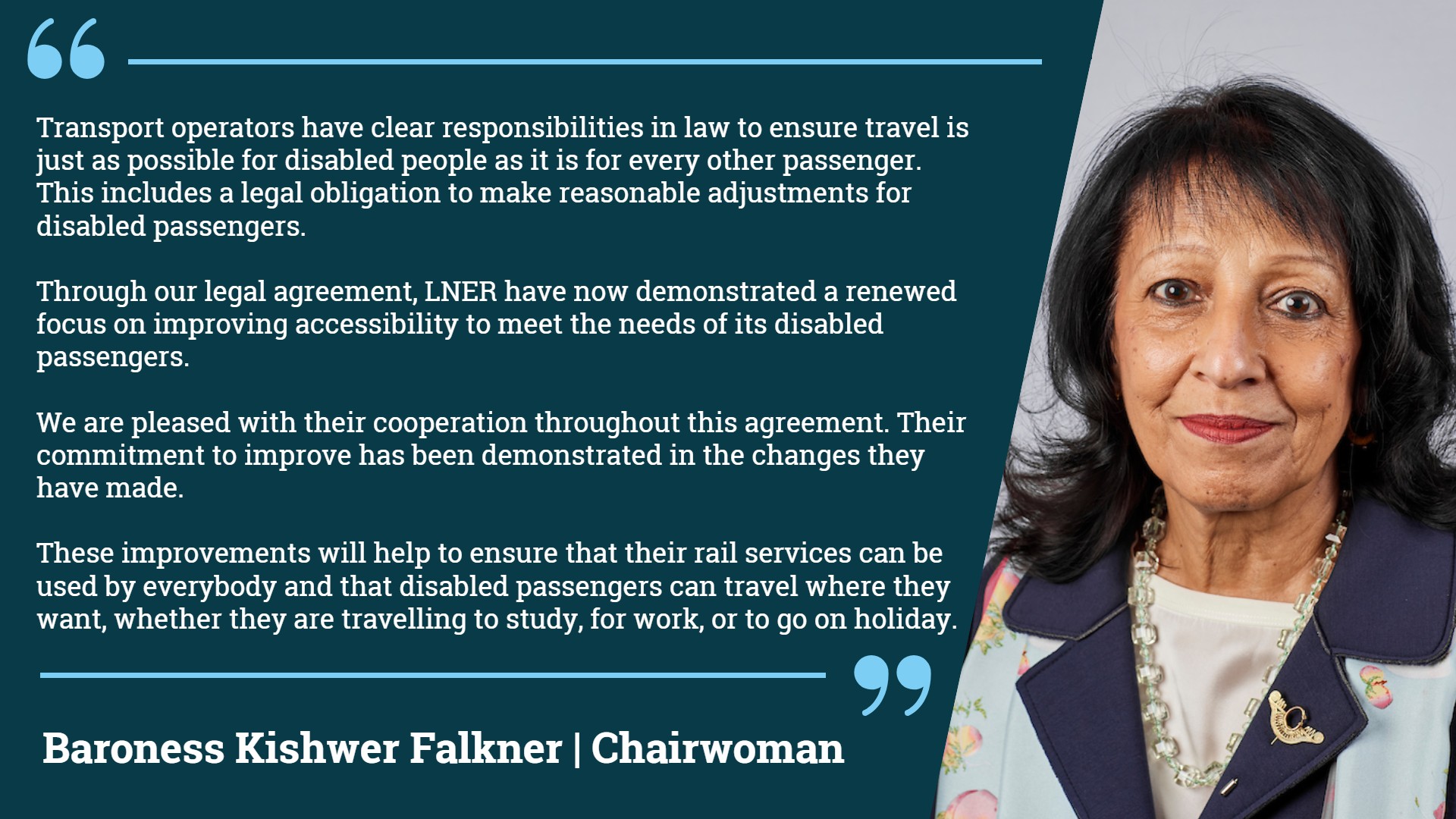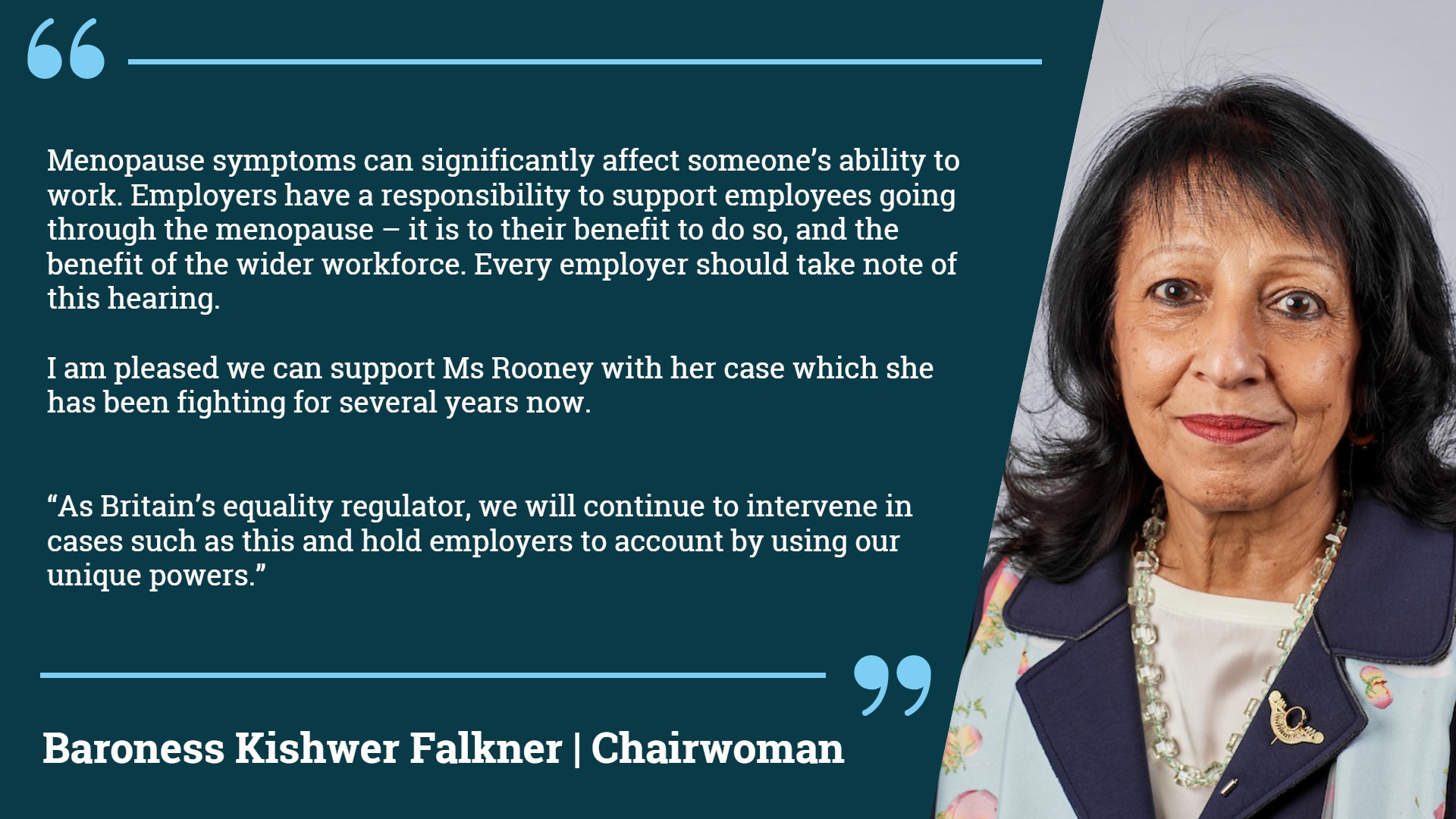|
 |
Legal agreement with LNER concludes
|
We have concluded a legal agreement with rail provider LNER after the company took the necessary steps to improve access to its services and facilities for disabled passengers.
In July 2020 we entered a legal agreement with LNER, following a legal challenge from a visually impaired customer who received inadequate support and assistance while travelling.
Under the agreement, LNER, which operates trains from London to the North of England and Scotland, were required to improve their assisted travel service and to conduct new training on accessibility and inclusion for all staff who deal with their customers.
LNER also set up new ways proactively to monitor the assistance it provides, and to learn lessons and find new solutions where these are needed.
In addition, the rail operator has established a disability access forum to generate further improvement initiatives, which have included a new wheelchair space booking feature and a 24-hour booking service for passenger assistance requests.
|  | | | Find out more about our work with LNER | |
|
|
Our response to proposed rail ticket office closures
We have submitted a response to the Department for Transport (DfT) consultation on the proposed closure of ticket offices across the rail network. In July, we sent a letter to DfT to express our concern over the proposed closure of rail ticket offices, reminding train companies and DfT of their legal obligations under the Public Sector Equality Duty of the Equality Act 2010 to protect the rights of those with protected characteristics.
We welcome the extension of the consultation period by DfT, but we remain concerned about the potential impact of ticket office closures, particularly on disabled and older rail users.
We will continue to encourage train companies to act to minimise any adverse impacts, particularly on disabled and older people.
| | | Read our statement on the proposed ticket office closures | |
|
|
 |
Employment Tribunal hearing that will consider menopause discrimination claims
Ms Maria Rooney, a former employee at Leicester City Council (LCC), has successfully taken LCC to an employment tribunal after experiencing discrimination as a result of her menopause symptoms.
Maria Rooney was suffering from menopause symptoms, and anxiety and depression, when she took periods of extended sickness leave from her job as a social worker for LCC in 2017 and 2018..
Ms Rooney resigned in October 2018 after receiving a formal warning from her employer over her absences, despite disclosing the menopause symptoms she was suffering. In January 2019, she lodged claims with the Employment Tribunal against Leicester City Council.
Following several preliminary hearings and an appeal, an Employment Tribunal ruled that Ms Rooney’s disability was by virtue of her symptoms of menopause combined with symptoms of stress and anxiety.
With our support, the claims of Ms Rooney, relating to how employers treat employees who are experiencing menopause symptoms will be heard at an Employment Tribunal in Leicester on Monday 2 October.
|  |
|
|
|
Brook House Inquiry Report
In September, the Brook House Inquiry published a report with its findings and recommendations. This report follows a public inquiry into the decisions, actions and circumstances surrounding the mistreatment of individuals who were detained at Brook House Immigration Removal Centre in 2017.
The Brook House Inquiry was set up in response to the footage recorded by an undercover reporter shown in the BBC Panorama programme “Under-Cover: Britain’s Immigration Secrets”, aired on 4 September 2017.
At the time of the Panorama programme, our then-CEO sent a letter to the Home Secretary raising concerns about the treatment of detainees at the Brook House Centre.
| | | Read the Brook House Inquiry report | |
|
|
 |
Technical guidance for schools updated
We have updated our technical guidance for schools in England and Scotland. Under the Equality Act 2020, schools have a legal obligation not to discriminate against, harass or victimise pupils in relation to the characteristics protected by the Act, which include disability, race and sex.
The guidance has been reviewed to ensure its references to the protected characteristics of sex and gender reassignment reflect developments in this complex area of policy and law, which continues to evolve.
Our technical guidance outlines the obligations the Equality Act places upon schools regarding pupils with protected characteristics and the provision of their education.
It helps school leaders to understand and comply with the Act and suggests steps schools can take to ensure they are meeting their obligations.
The Department for Education will be issuing separate guidance for schools in England on supporting transgender students and they are expected to consult on this in due course.
We have urged the Department for Education to bring forward their guidance as soon as possible, to help provide much-needed clarity for schools and families. | | | Read our updated technical guidance for schools | |
|
|
Scottish Government consultation on health and social care staffing guidance
We have written to the Scottish Government about the development of the Health and Care (Staffing) (Scotland) Act 2019 statutory guidance. We highlighted the recommendations of our inquiry into racial inequality in health and social care workplaces.
Among the applicable recommendations are improved commissioning practices, ensuring staff have relevant knowledge of their employment rights and overcoming staff fears of raising concerns, all of which are relevant to the guiding principles set out in the consultation on the statutory guidance.
| | | Read our letter to the Scottish Government on the Health and Social Care Staffing Guidance | |
|
|
 |
Proposed restraint and seclusion (Prevention in Schools) (Scotland) - draft proposal
We have responded to the Scottish Parliament consultation on the proposed Restraint and Seclusion (Prevention in Schools) Bill. Introduced by Daniel Johnson MSP (Scottish Labour), this Member’s Bill aims to ensure restraint and seclusion are only used as a last resort in schools, where there is an immediate risk of harm and using appropriate methods.
We support the aims of the proposed Bill, however we recommend that the Scottish Government considers placing its guidance on restraint and seclusion (which it consulted on last year) on a statutory footing from the outset. | | | Read our consultation response to the Proposed Restraint and Seclusion Bill | |
|
|
Our fund for race discrimination cases
Our fund for race discrimination cases supports people who have experienced prejudice and discrimination because of their race. It's part of our Legal Support Scheme which provides funding and legal assistance to victims of injustice who would normally struggle to access legal support.
We have a panel of solicitors who support our legal work including those under our fund for race discrimination cases. Through the use of our fund, we supported a man who was barred from booking a christening party for his baby daughter at a Conservative club because he was an Irish Traveller. After bringing forward a claim for racial discrimination, with our support he has been awarded compensation.
No one should be discriminated against because of who they are, and members of the Gypsy, Roma and Traveller communities can often face harassment and discrimination due to negative stereotypes and deeply ingrained prejudices.
In September, we attended the Race and Justice Conference where colleagues discussed access to justice and shared information about our Legal Support Scheme for race discrimination cases. | | | Find out more about our fund for race discrimination cases | | | Read about the successful settlement funded by our legal support scheme | |
|
|
 |
New blog on our report to the UN Committee on the Rights of Persons with Disabilities
In September, we submitted a report to the UN Committee on the Rights of Persons with Disabilities, which monitors compliance with the UN Convention on the Rights of Persons with Disabilities (CRPD). This report was a joint submission with our partners in the UK Independent Mechanism, which includes the Equality Commission for Northern Ireland, the Northern Ireland Human Rights Commission and the Scottish Human Rights Commission. Our joint report was a follow-up to the Committee’s 2016 inquiry into the rights of disabled people in the UK, which had found ‘grave and systemic’ violations of the CRPD.
In a new blog, Rowen Siemens from our Human Rights Monitoring team discusses the assessments made in our report of how much progress has been made since the 2016 inquiry, our concerns that violations of the CRPD still persist today and our ongoing work in this area. | | | Read the blog on our joint report to the UN Committee on the Rights of Persons with Disabilities | |
|
|